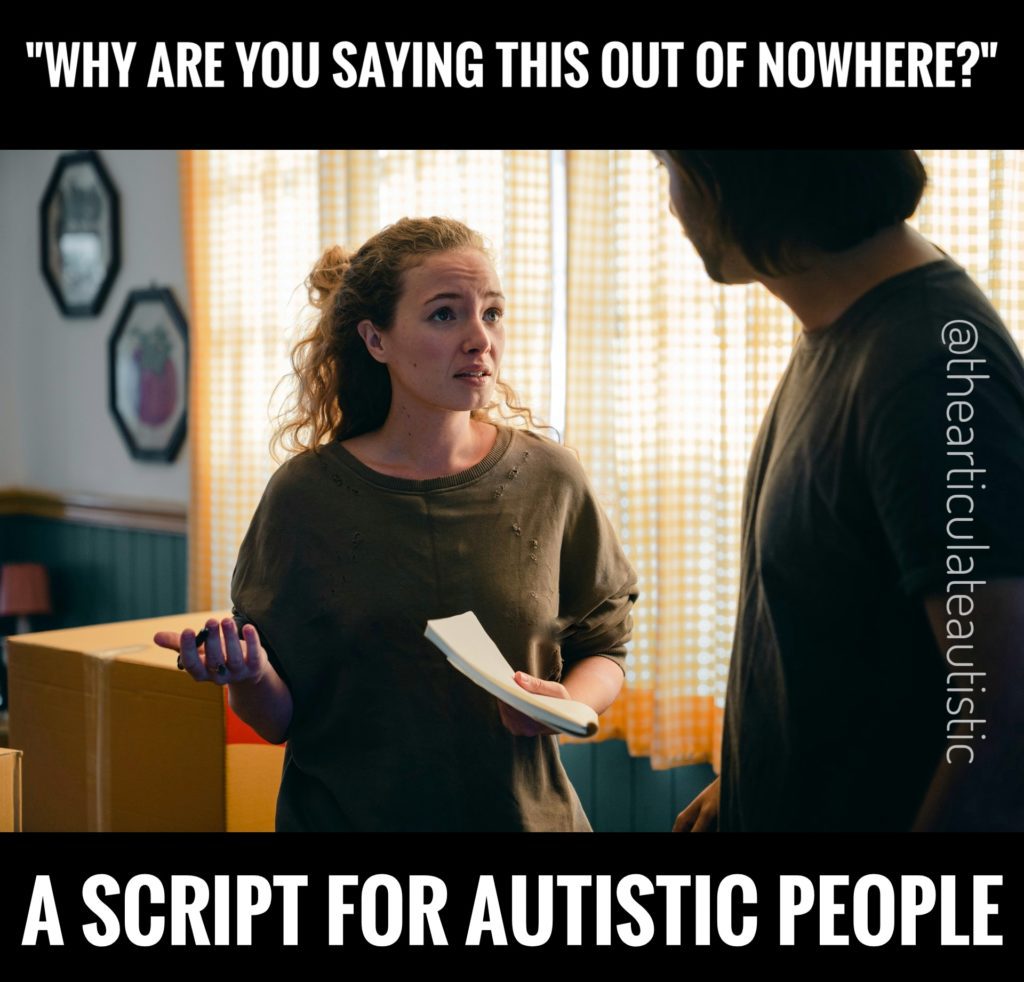“Why Are You Saying This Out of Nowhere?” – A Short Script for Autistic People to Decrease Misunderstandings

I’m not big into masking and scripting for autistic people, so I don’t plan to post many scripts on this website, but I thought this one might be helpful.
I can’t tell you how many times I’ve been in a conversation with someone, and they have asked me a question while sounding suddenly angry or offended, and I would freeze up and stammer, which, I discovered much later in life, made me look guilty in the eyes of neurotypical people!
So, finally, after years (as is typical for autistic people) I have a comeback!
“Why are you saying/asking this out of nowhere?”
Allow me to elaborate: Since I often had trouble connecting my behavior to someone’s response, I would get reactions from neurotypical people that would truly seem out of nowhere for me.
I used to call this Attack of the Vultures, and I wrote about it once on a website called Spectrum Women.
Everything was fine one minute, the person was angry with me the next, and, because of trauma, I would just freeze up, stammer, and go non-verbal (which, again, looks like guilt to neurotypical people).
I had no idea what was going on, and it scared me because I thought all the neurotypical people around me were just mentally unstable and would get angry for no reason. (I thought that for many years, but I don’t now.)
Here’s an example:
“Do you think I’m stupid or something?”
Since I need very detailed, step-by-step instructions when I’m learning something new, I also teach the same way. In the past, I’ve had people ask me, in the middle of showing them how to do something, if I thought they were stupid.
I couldn’t understand why their mood and demeanor towards me had changed so suddenly, and I made NO CONNECTION to what I had said or done to their response to me, but I wasn’t able to articulate that I wasn’t making the connection.
Again, I would just freeze up and go non-verbal out of confusion and fear. Or, I would ask, “Huh?” “What are you talking about?” But, those didn’t seem like genuine questions to neurotypical people because neurotypical people don’t use questions the same way autistic people do.
The neurotypical person thought I was asking questions to be defensive or deflect my “wrongdoing”. Then again, I was never very clear about how I was perceiving their question or statement because I didn’t know how to be.
When I ask, “What are you talking about?” I mean just that. I don’t know what you’re talking about, and I need clarification in order to continue to have a dialogue with you.
On the other hand, neurotypical people can use “What are you talking about?” as a way to defend themselves even when they know full well what the other person is talking about, even when they did or said something rude on purpose!
What might have worked better for me was to say, “Why are you asking me that question out of nowhere?”
I haven’t tested this, but I think the “out of nowhere” addition better clarifies genuine confusion and shows how I’m viewing their response.
Instead of seeming defensive or like you’re trying to hide something, you answer the question with a question, turn it back around to the other person and get them to explain what they mean.
Also, if you’re someone who becomes hyper-verbal instead of non-verbal (I can go either way depending on the situation), avoid doing what I’ve done in the past (which is desperately trying to explain myself through terrified stammers), and just let the question hang there until they answer.
If they say, “You know what you did”, tell them calmly that you really don’t know what you did and could they please explain it. If they still refuse to explain why they’re upset at that time, that’s on them.
If you’re in a safe position to do so, tell them you must discontinue the conversation until they’ve calmed down. Nobody has a right to disrespect you and make you feel as though you’ve done something wrong when you had absolutely no intention of doing so, especially when they flatly refuse to explain their response to you.
Inter-neurotype communication is a two-way street, and most of my articles are aimed at helping neurotypical people better understand neurodivergent people, but I wanted to offer this script as an option in case anyone could use it.
Follow me on Instagram.
Want downloadable, PDF-format copies of these blog posts to print and use with your loved ones or small class? Click here to become a Patreon supporter!




